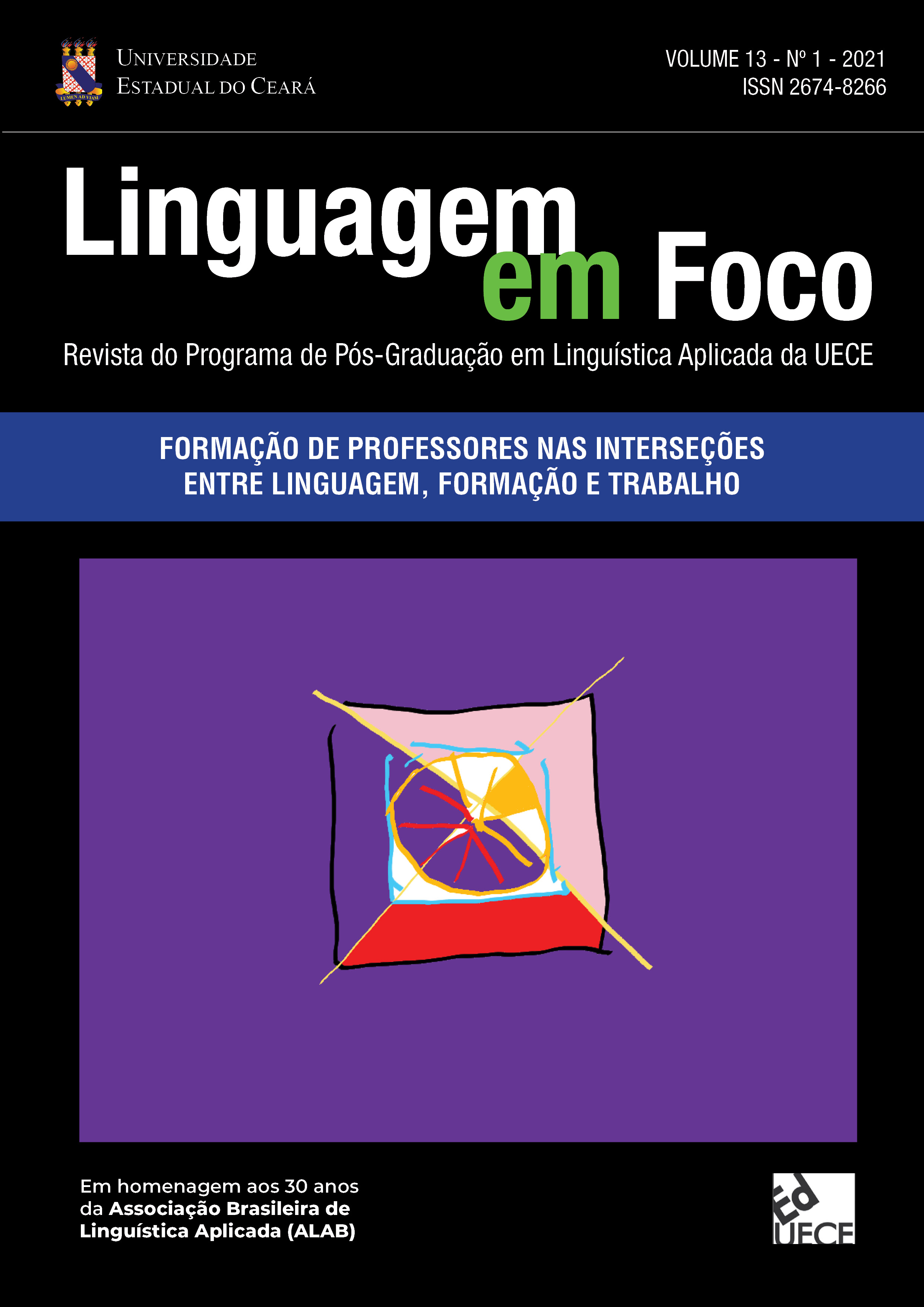Ára Ayvu Regua
Indigenous teachers’ education
DOI:
https://doi.org/10.46230/2674-8266-13-4991Keywords:
Teacher’s Education, Indigenous Teachers, Ecology of Knowledge, Participatory Methodology, Linguistic EducationAbstract
Teachers’ education in Brazil is confronted by diverse contingencies, which promotes a significant research and education field. Especially, indigenous schools, which have specific legislations after the implementation of the Federal Constitution in 1988 (BRAZIL, 1988), entail peculiar contexts to the development of initial and continuous teachers' education. This article presents part of a research-action oriented towards an ecology of knowledge (SANTOS, 2010; 2011) developed in co-authorship with teachers from the indigenous school Escola Estadual Indígena Mbya Arandu, from the Indigenous Territory Araça’í, in the Atlantic Forest, in Brazil. Our objective was to problematize, within the spectrum of the developed research-action, practices and epistemologies related to literacy and linguistic education in a context of continuous teachers’ education. Making use of participatory methodologies (FRANCO, 2005; SMITH, 2008), five events have taken place, involving five Guarani teachers, one non indigenous teacher, students, and an elder from the indigenous territory. Results show the relevance of interactions between universities and indigenous peoples that are based upon participatory methodologies for establishing indigenous teachers’ education experiences. The problematization, materialized in multimodal texts (MENEZES DE SOUZA, 2002), later took fundamental part in the elaboration of legal documents and teachers’ lesson planning. Therefore, this article offers fertile perspectives, which may incite similar experiences even if in different contexts.
Downloads
References
BRASIL. Constituição da República Federativa do Brasil. Brasília, DF: Senado Federal: Centro Gráfico, 1988.
BRASIL. Decreto nº 6.861 de 27 de maio de 2009. Dispõe sobre a educação escolas indígena. Disponível em: https://www.senado.leg.br/atividade/const/con1988/con1988_15.12.2016/art_210_.asp#:~:text=Ser%C3%A3o%20fixados%20conte%C3%BAdos%20m%C3%ADnimos%20para,e%20art%C3%ADsticos%2C%20nacionais%20e%20regionais. Acesso em: 10 fev. de 2021.
BRASIL. Ministério da Educação. Referencial Curricular Nacional para as Escolas Indígenas (RCNEI/Indígena, 2002). Brasília, DF: MEC, 1998.
CHEREM, Lúcia. Escrita e oralidade: duas progressões paralelas de um desenvolvimento comum. Revista X, vol. 2, 2006, p. 1-7. Disponível em: https://revistas.ufpr.br/revistax/article/view/5443. Acesso em: 20 maio 2021.
CLANDININ, D. J. Handbook of narrative inquiry: mapping a methodology. Thousand Oaks, London, New Delhi: Sage, 2007.
D’ANGELIS, Wilmar da Rocha. Propostas para a formação de professores indígenas no Brasil.Revista Em Aberto, Brasília, v.20, n. 76, 2003, p. 3-43. Disponível em: http://www.emaberto.inep.gov.br/ojs3/index.php/emaberto/article/view/2585. Acesso em: 20 maio 2021.
FOUCAMBERT, Jean. Modos de ser leitor: aprendizagem e ensino da leitura no ensino fundamental. Tradução: Cherem, L. P.; Bornatto, S. P. Curitiba: Editora UFPR, 2. Ed., 2014, 173p.
FRANCO, Maria Amélia Santoro. Pedagogia da Pesquisa-Ação. Educação e Pesquisa, Revista da Faculdade de Educação da USP, v. 31, n.3, 2005. p. 83-502. Disponível em: https://www.scielo.br/pdf/ep/v31n3/a11v31n3.pdf. Acesso em: 20 maio 2021.
GARNETT, Stephen T. et al. A spatial overview of the global importance of Indigenous lands for conservation. Nature Sustainability, 1, 2018, p.369–374. Disponível em: https://www.nature.com/articles/s41893-018-0100-6. Acesso em: 20 maio 2021.
INSTITUTO BRASILEIRO DE GEOGRAFIA E ESTATÍSTICA – IBGE. Censo Demográfico: Características Gerais dos Indígenas. Rio de Janeiro: IBGE, 2010.
INSTITUTO DE PESQUISA AMBIENTAL DA AMAZÔNIA–IPAM.Terras indígenas na Amazônia brasileira: reservas de carbono e barreiras ao desmatamento. Brasília – DF/IPAM. 2015. Disponível em: https://ipam.org.br/wp-content/uploads/2015/12/terras_ind%C3%ADgenas_na_amaz%C3%B4nia_brasileira_.pdf Acesso em: 10 fev. 2021.
JANICOT, Annie (coord.). Dossier Voie Directe: Extrait des Actes de Lecture nº 100. Association Française pour la Lecture. 2007 Disponível em: www.lecture.org. Acesso em: 23 jan. 2020.
JEKUPÉ, Olivio. Parte 1: A Literatura Nativa. Vídeo do canal web Histórias Nativas, 2019. Disponível em: https://www.youtube.com/watch?v=wSZ-3F7W5_8&t=330s Acesso em: 12 fev. 2021.
JEKUPÉ, Olivio; KEREXU, Maria; GISELDA, Jera. A Mulher que virou urutau. Kunhã urutau re ojepota. São Paulo: Editora Panda Books, 2011.
KRENAK, Ailton.Ideias para adiar o fim do mundo. São Paulo: Companhia das Letras, 2019. 46 p.
MAHER, Terezinha Machado. A formação de professores indígenas: uma discussão introdutória. In GROUPIONI, Luís Donisete Benzi(org.). Formação de professores indígenas: repensando trajetórias. Brasília: Ministério da Educação, 2006, p. 11-38.
MENEZES DE SOUZA, Lynn Mario Teixeira. A Case among Cases, a World among Worlds: the ecology of writing among the Kashinawá in Brazil. J Lang Identituy Educ, v. 1, n. 4, 2002, p. 261-278.
MERLADET, Fábio A. D.; MIRANDA, Isabella G. Ecologia de Saberes na prática: o trabalho da tradução no Fórum Social Mundial e na Universidade Popular dos Movimentos Sociais. Tempus, atas de saúde coletiva, Brasília, v. 8, n.2, p. 257-273, 2014. Disponível em: https://tempusactas.unb.br/index.php/tempus/article/view/1523. Acesso em: 20 maio 2021.
MIKKELSEN, Cæcilie (ed.). The Indigenous World, 2015. Copenhagen: IWGIA, 2015.
MUNDURUKU, Daniel. As Peripécias do Jabuti. São Paulo: Editora Mercuryo Jovem, 2007.
PANIKKAR, Raimon. Paz e interculturalidad. Una reflexión filosófica. Barcelona: Herder, 2006.
SANTOS, Boaventura de Souza. Para além do pensamento abissal: das linhas globais a uma ecologia de saberes. Novos estudos CEBRAP, São Paulo, n. 79, p. 71-94, 2007. Disponível em: https://www.scielo.br/scielo.php?script=sci_arttext&pid=S0101-33002007000300004. Acesso em: 20 maio 2021.
SANTOS, Boaventura de Souza.A gramática do tempo: para uma nova cultura política. 3. ed. São Paulo: Cortez, 2010.
SANTOS, Boaventura de Souza.A universidade do século XXI: por uma reforma democrática e emancipatória da universidade. 3.ed., São Paulo: Cortez, 2011.
SANTOS, Boaventura de Souza; MENESES, Maria Paula (org.) Epistemologias do Sul. Coimbra: Edições Almedina, 2009.
SMITH, Linda Tuhiwai. Decolonizing Methodologies: Research and Indigenous Peoples. London & New York: Zed Books, 2008.
THE WORLD BANK. Indigenous Peoples. Washington: The World Bank Group, 2020. Disponível em:https://www.worldbank.org/en/topic/indigenouspeoples#3. Acesso em: 10 fev. 2021.
Published
How to Cite
Issue
Section
License
Copyright (c) 1969 Fernanda Martins Felix

This work is licensed under a Creative Commons Attribution 4.0 International License.
Authors who publish in Linguagem em Foco Scientific Journal agree to the following terms:
- Authors retain the copyright and grant the journal the right of first publication. The articles are simultaneously licensed under the Creative Commons Attribution License which allows sharing the work with an acknowledgement of its authorship and initial publication in this journal.
- The concepts issued in signed articles are the absolute and exclusive responsibility of their authors. Therefore, we request a Statement of Copyright, which must be submitted with the manuscript as a Supplementary Document.
- Authors are authorized to make the version of the text published in Linguagem em Foco Scientific Journal available in institutional repositories or other academic work distribution platforms (ex. ResearchGate, Academia.edu).





























